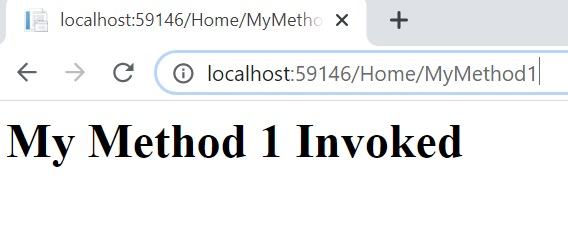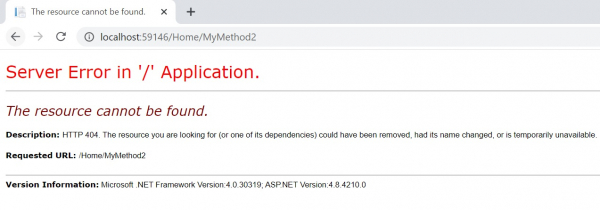
 Data Structure
Data Structure Networking
Networking RDBMS
RDBMS Operating System
Operating System Java
Java MS Excel
MS Excel iOS
iOS HTML
HTML CSS
CSS Android
Android Python
Python C Programming
C Programming C++
C++ C#
C# MongoDB
MongoDB MySQL
MySQL Javascript
Javascript PHP
PHP
- Selected Reading
- UPSC IAS Exams Notes
- Developer's Best Practices
- Questions and Answers
- Effective Resume Writing
- HR Interview Questions
- Computer Glossary
- Who is Who
What is the significance of NonActionAttribute in ASP .Net MVC C#?
The NonAction attribute is used when we want a public method in a controller but do not want to treat it as an action method. An action method is a public method in a controller that can be invoked using a URL. So, by default, if we have any public method in a controller then it can be invoked using a URL request. To restrict access to public methods in a controller, NonAction attribute can be used.
Now let us consider HomeController having two public methods MyMethod1 and MyMethod2.
Controller
Example
using System.Web.Mvc;
namespace DemoMvcApplication.Controllers{
public class HomeController : Controller{
public string MyMethod1(){
return "<h1>My Method 1 Invoked</h1>";
}
public string MyMethod2(){
return "<h1>My Method 2 Invoked</h1>";
}
}
}
Let us invoke both the methods in the HomeController using the below URLs.
http://localhost:59146/Home/MyMethod1
http://localhost:59146/Home/MyMethod2


Let's say MyMethod2 is for some internal purpose, and we don't want it to be invoked using a URL request. To achieve this, we have to decorate it with NonAction attribute.
Controller
Example
using System.Web.Mvc;
namespace DemoMvcApplication.Controllers{
public class HomeController : Controller{
public string MyMethod1(){
return "<h1>My Method 1 Invoked</h1>";
}
[NonAction]
public string MyMethod2(){
return "<h1>My Method 2 Invoked</h1>";
}
}
}
Below is the output of making a MyMethod2 Non Action.
Output


